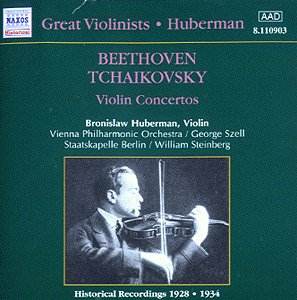Ludwig van BEETHOVEN (1770 - 1827)
Violin Concerto in D Major, Op 61
38'42"
Pyotr Ilyich TCHAIKOVSKY (1840 - 1893)*
Violin Concerto in D Major, Op 35** 28'21"
 Bronislaw Huberman (violin)
Bronislaw Huberman (violin)
Vienna Philharmonic Orchestra / George Szell
Staatskapelle Berlin / William Steinberg
 AAD Naxos 8.110903 "Great
Violinists" Series
[67'02"]
AAD Naxos 8.110903 "Great
Violinists" Series
[67'02"]
Crotchet
Amazon
UK
Amazon
USA

This recording is most emphatically not for the general listener who wants
a coupling of the Beethoven / Tchaikovsky Concertos. With that said we can
move on to what the recording is. Released under the Naxos Great
Violinists series it incorporates two performances by Bronislaw Huberman,
the Polish violinist (b 1882) who at 14 years of age played the Brahms Concerto
to an audience that included the composer. He was at his peak when Hitler
came to power, after which he refused further engagements in Germany and
became deeply involved in the founding of the Palestine Symphony Orchestra
(later the Israel SO). He died in 1947.
Technically inclined listeners will be fascinated by the process which lead
up to this CD release. The process is under the control of the engineers
David Lennick (Beethoven) and Mark Obert-Thorn (Tchaikovsky) working with
the best available 78 pressings available, giving, it is said, better results
often than working from the original matrixes. Perhaps, for contractual reasons
these matrixes are not available, perhaps it is a matter of choice - I do
not know. I do know that the results are remarkable. I am using headphones
for my listening as I write this piece and obviously there is a constant
level of mush from the grooves, but this noise ceases to be a serious problem.
Personally, I think that as it is a constant noise the ears and mind adjust
and allow for it. I well remember how frustrating listening to vinyl was
- the more I cleaned - dust bugs (do you remember them, dear reader?) and
the more I spent on SME / Shure / special mats and the rest the more the
problem seemed to grow. But that was from intermittent and occasional clicks
- not the constant noise the mind can accommodate if my theory is right.
The 78's from which the Beethoven is taken are from a recording session in
June 1934 with the Vienna Philharmonic under George Szell. From his first
entry one is struck by Huberman's wonderful ringing tone - the recording
balance has him prominent but not excessively so - and technical magnificence
(try the closing cadenza to the Allegro starting at 16'57"). The performance
itself is a fine one with a Larghetto than seemed slow at 9'11"
(comparisons with a couple of more recent recordings show that it wasn't
after all) and a vigorous Rondo Finale. But no-one would be likely
to buy this disc for a 1934 VPO recording. If you buy it for Huberman you
are unlikely to be disappointed.
December 1928 is the date of the Tchaikovsky coupling with the Staatskapelle
Berlin and William Steinberg. The CD notes point out that the Concerto was
recorded over two days with a noticeable change of soloist / orchestra balance
between session and points out where these changes are likely to be most
obvious. I did not find it a problem after the engineers waved their wands.
In this work I was more aware of period-style playing with the slides and
slurs from another era. But what magic.
Those uncertain should be aware of the obvious drawbacks - the boomy bass,
limited dynamic range, and of course, the groove noise. Nevertheless these
recordings (especially the Beethoven) are too good to miss if you admire
violin playing of the very highest order. Try before buying, just a moment
should help you make up your mind.
Reviewer
Harry Downey
PERFORMANCE

RECORDING
HISTORICAL
